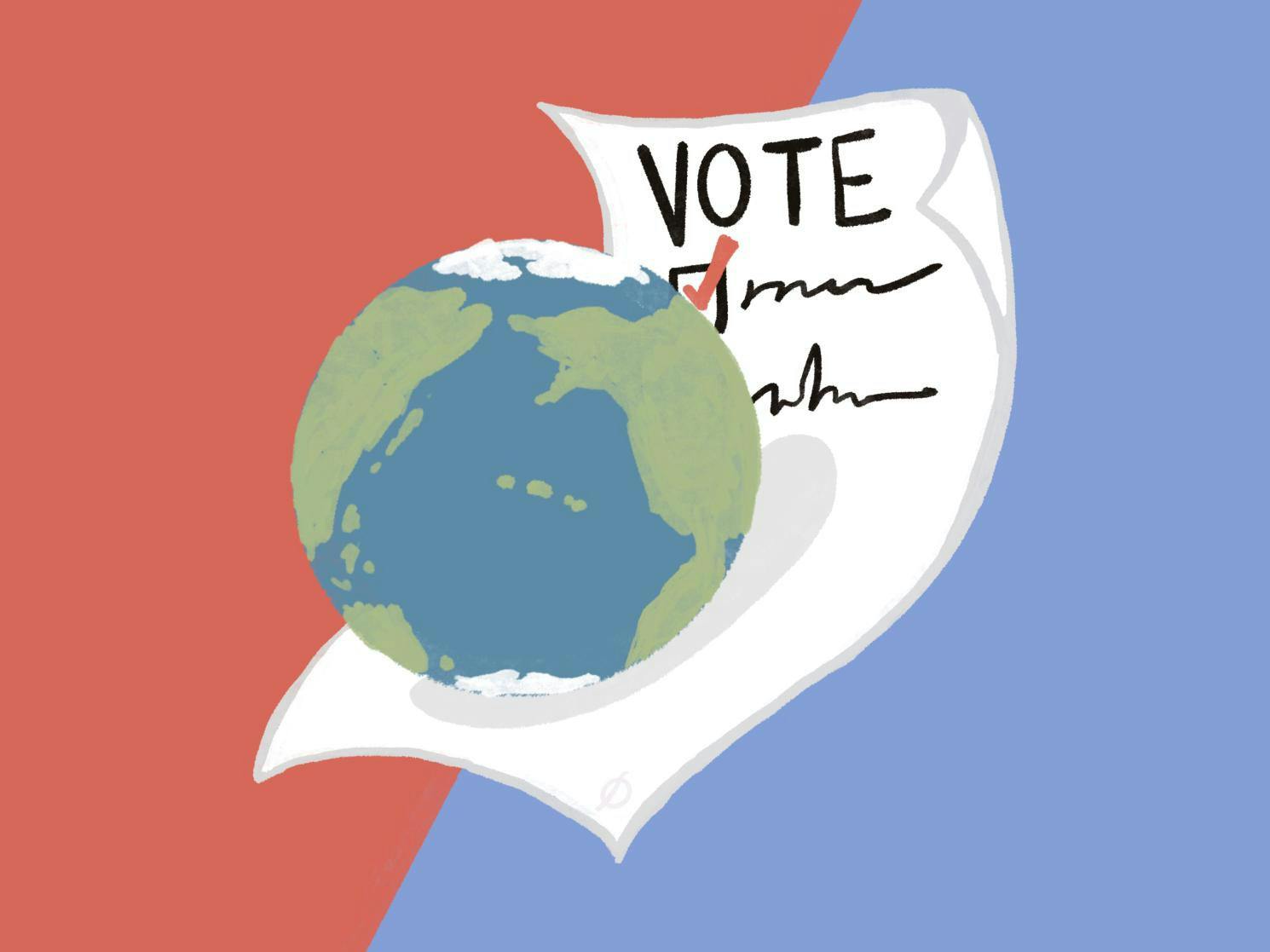Racial equity, immigration policies, reproductive rights and responding to the COVID-19 pandemic are among the many polarizing, politicized issues that are driving the upcoming Nov. 3 election.
However, another important, yet divisive issue in the country affects the air we breathe, the food we consume and the weather we endure: climate change.
“Climate change is always on my mind at this point because it’s such a big issue,” civil engineering sophomore and leadership member of Sunrise MSU Julia Rudlaff said. “I think a lot of people, especially in this generation, are understanding more that it’s a real issue. But specifically, I think that more people need to be taking it seriously and recognizing that climate change isn’t something that is abstract and scientific.”
According to the NASA website, the average global temperature has risen two degrees since 1880, with 19 of the 20 warmest years on record occurring since 2001. Also, carbon dioxide levels have risen 415 parts per million, the highest it’s been in 650,000 years, according to the website.
Currently, the recent widespread wildfires in California and devastating hurricanes in the Southern U.S. have been connected to the increasingly warming planet by many in the scientific community.
Leading up to the election, President Donald Trump and former Vice President Joe Biden have taken stark opposing stances on climate change, sparking fierce debate among their supporters and a country divided on this issue.
“I think the reason for that is, unfortunately, because there is a lot of money in denying the reality of climate change,” Phillip Warsaw, assistant professor in the department of community sustainability, said. “This is particularly true for both fossil fuel companies and for our electrical utilities. ... For companies, particularly oil companies and other fossil fuels (like) coal, natural gas, etc., the more we recognize climate change as a reality, the more pressure there is to regulate those companies, which would then, of course, result in them paying a lot more money and losing profits.”
Biden’s climate change plan includes investing in public sectors, such as public transportation, electricity, buildings and the auto industry, making them more eco-friendly while creating jobs, according to his campaign website.
Though she believes this is a good step toward climate justice, comparative cultures and politics senior Sara Millies-Lucke said this is only a first step.
“He's (Biden) definitely getting us pointed in the right direction, but I don’t think we should be complacent with everything,” Millies-Lucke, president of DivestMSU, said. “His campaign did not talk anything about fossil fuel divestment, which is something obviously we’re (DivestMSU) very passionate about. So, I think it’s a start to kind of start redesigning how we build, how we live, how we move and everything to start to change our society in a way that’s more climate friendly, but I think there’s a lot more he could be doing.”
In contrast, Trump has often denied the science behind climate change, instead focusing his campaign on “increasing exports of energy resources into the global market,” according to his campaign website.
Trump also pulled the United States from the Paris Agreement, an agreement within the United Nations Framework Convention on Climate Change that addressed global greenhouse gas emissions. President Barack Obama originally signed the agreement in 2016.
“It certainly undermines our reputation in the international world,” political theory and constitutional democracy senior and DivestMSU Vice President Jake Nessel said. “I know when Barack Obama signed the climate agreement, it was a big step forward. Then Donald Trump said 'we’re not going to agree with that.' But, we have an international crisis with climate refugees because they’re being forced to flee from their homes, and floods and hurricanes and natural disasters are just ravaging these areas. When Trump says that we aren’t going to follow these international agreements, that threatens our reputation.”
Rudlaff said that voters have to recognize that climate change affects them in their everyday lives. Voters should do their research on candidates’ policies and endorsements to get a sense of what each candidates’ priorities are.
The Nov. 3 election is more than a presidential one. Michigan’s U.S. Senate seat, delegation to the U.S. House of Representatives, state legislature and state Supreme Court justices are all being decided by voters that Tuesday.
More locally, two seats on the MSU Board of Trustees are up for grabs, and those candidates will help decide how MSU reacts to climate change on a university level.
In the past, Warsaw said MSU has supported research that goes toward sustainability and environmental science. However, Warsaw said the university hasn’t reduced its overall fossil fuel use and divested from fossil fuel companies, despite many students’ demands.
Millies-Lucke said the issue of climate change has become politicized and divisive because it’s a human-made issue that reveals a lot of ugly truths in society that lead to this problem.
“It’s a product of our own making,” Millies-Lucke said. “And we have to examine how we built our society, how we treated individuals and treated our climate. How we’ve built this system that is making our planet sick. It forces us to really examine things that we’d like to turn a blind eye to.”
However, new voters are encouraged to consider the implications of not addressing climate change before casting their ballot.
Support student media!
Please consider donating to The State News and help fund the future of journalism.
“It’s easier to push for change when you’re moving in the right direction versus when you’re playing defense to keep the change you already have,” Warsaw said. “We’ve seen that in the last four years. So, I think we have to always be pushing. If you’re someone who believes in climate change, for that change to happen, but also recognizing it’s better to vote for the person who can steer the ship in the right direction, even if they’re not going to drive as far forward as we want.”
Regardless of political leaning, climate change is an issue many people at MSU want addressed on a university, state and national level.
“There’s really no reason to support a candidate who doesn’t believe in climate change at this point,” Warsaw said. “Increasingly, you are slowly starting to see more and more Republicans and other conservatives start to acknowledge climate change as a reality because they don’t have a choice. ... We know that this isn’t a game. This is real, and I would support voting out candidates who can’t accept that reality. It’s possible to be a conservative and also believe in climate change.”
This article is part of our Election 2020 print edition. View the full issue here.
Discussion
Share and discuss “Students, professor explain importance of climate change for upcoming election” on social media.








